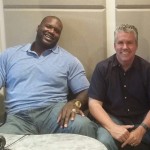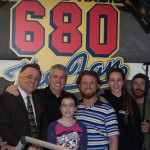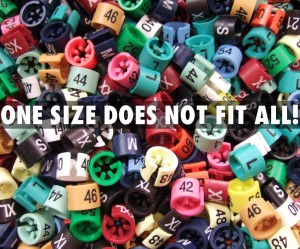To have success in the sports radio industry as an on-air personality, you’ve got to have an ability to make the audience think and laugh, while being comfortable in your own skin. Having a strong work ethic also helps.
 For John Kincade, those three things have played a critical role in fueling his success on the local and national scene. He’s been a fixture on 680 The Fan in Atlanta for the past 16 years, while also building his brand nationally on ESPN Radio and the CBS Sports Radio network. Over the past year he’s taken on the additional challenge of hosting two podcasts per week for the Podcast One network. To say he keeps busy would be an understatement.
For John Kincade, those three things have played a critical role in fueling his success on the local and national scene. He’s been a fixture on 680 The Fan in Atlanta for the past 16 years, while also building his brand nationally on ESPN Radio and the CBS Sports Radio network. Over the past year he’s taken on the additional challenge of hosting two podcasts per week for the Podcast One network. To say he keeps busy would be an understatement.
I first got to know John in 2005 when he came to Bristol, CT for a few test shows at the ESPN Radio Network. We worked together on the program “GameNight” and instantly clicked. I thought he was an exceptional on-air talent, but even more impressive was that he was easy to produce. He had a strong passion for radio and although he had achieved a lot of success, he remained very coachable. Not every talent operates that way.
Throughout the years we’ve stayed in touch and discussed numerous on-air subjects, industry developments and ways to make our format stronger. I have a great deal of respect for how he approaches his craft and what he provides through the speakers. His willingness to adapt, work hard, and appreciate the opportunities he’s earned makes it very easy to root for him.
 When I decided to start featuring some written content from other members of the sports media, John was one of the first to reach out. That speaks to his passion for our business and his interest in helping others enjoy many of the same successes that he has.
When I decided to start featuring some written content from other members of the sports media, John was one of the first to reach out. That speaks to his passion for our business and his interest in helping others enjoy many of the same successes that he has.
A quick reminder, if you work in the sports media industry and would like to write a future piece, email JBarrett@hvy.tcp.mybluehost.me.
In this article, John provides some excellent information and opinion on why programmers and personalities need to be open minded and willing to adjust their strategy for different situations. Although many have their own personal views and formulas, sports radio is not a one size fits all business, and each market requires a different plan of attack.
Rather than try to explain it myself, John Kincade the floor is all yours.
One Size Does Not Fit All In Sports Talk Radio
Not many men or women can say they’ve had their dream job. I’m blessed to be one that has. In a quarter of a century in the sports radio business, I’ve done it all. I learned early on that arriving behind the microphone was not a destination. It is supposed to be an ongoing journey of evolution as a host. Those who feel they have arrived can find their tenures short lived.
I have the titles of intern, producer, reporter, local host and national host on my career resume. I appreciate my career more because of the grind it was to get my opportunities and what it continues to take to stay employed. Every step along the way I have learned something. Being a successful talk show host means you need to be part student and part thief. You must be willing to constantly learn and also have the ability to take little skills from others you admire and make them your own.
 One lesson has the most clarity for me. There is NOT a “one size fits all approach” to success in sports radio. This is true for hosts, producers and stations themselves. What works in New York would fail miserably in Atlanta. The successful station in Boston can’t just be recreated in Kansas City. If you don’t know your terrain and audience, you are destined for failure. I don’t know how many PD’s, Producers or Hosts have espoused their sure fire methods for success to me. Truth is, there is not one method that works everywhere for hosts. There are some things though that a host can do in any market to be successful.
One lesson has the most clarity for me. There is NOT a “one size fits all approach” to success in sports radio. This is true for hosts, producers and stations themselves. What works in New York would fail miserably in Atlanta. The successful station in Boston can’t just be recreated in Kansas City. If you don’t know your terrain and audience, you are destined for failure. I don’t know how many PD’s, Producers or Hosts have espoused their sure fire methods for success to me. Truth is, there is not one method that works everywhere for hosts. There are some things though that a host can do in any market to be successful.
As co-host of the “Buck and Kincade Show” with Buck Belue on 680 The Fan I have learned many lessons. We debuted in September of 2000, and 16 football seasons later we are still going strong. This has required evolution, reinvention and input from many different people to keep the show successful. Truth be told, I refuse to take every piece of advice I receive. I sift through the opinions of others to find what works for me and my shows. I found out long ago that there are many exceptional talents who never sat behind the mic. These station leaders have knowledge and advice to share, but many times fail to connect with the personalities they’re asked to coach. We are not always the most open minded people in the room.
In the world of local radio, your city is different than my city. In Philadelphia, New York and Boston you have a built in audience with generational ties to the city and the teams that play there. This is not the case for Atlanta, Miami and Houston. The problem is there are programmers who believe there are methods you can just cut and paste from one market to another. It doesn’t work like that. It’s harder working in a transient local market than a city with deep rooted sports heritage. Yet there are things that would help make you a great host that you can do in both places. That is where being a student and a thief serves you well. The PD in the Northeast may find grinding calls is a successful formula. That can’t just be plugged into another market without the built in captive sports fan loyalty. In those markets, you need to entertain and engage to create a show worth sticking around for.
 As an intern and show contributor, I was exposed to some of the top names in our industry. The legendary Tony Bruno put me on the air for the first time as a correspondent when I worked for the Philadelphia Flyers. He then introduced me to Angelo Cataldi who began to showcase my comedic talents in weekly bits on Sports Radio WIP. I got to watch Howard Eskin work his magic on TV and Radio from behind the scenes. Fact is I stole components from each of them. Eskin was relentless in his desire to have strong opinions. Bruno thought every intense sports debate could always have a punch line. Cataldi was the master of creating the circus and orchestrating a team. The lessons I learned from them have worked for me.
As an intern and show contributor, I was exposed to some of the top names in our industry. The legendary Tony Bruno put me on the air for the first time as a correspondent when I worked for the Philadelphia Flyers. He then introduced me to Angelo Cataldi who began to showcase my comedic talents in weekly bits on Sports Radio WIP. I got to watch Howard Eskin work his magic on TV and Radio from behind the scenes. Fact is I stole components from each of them. Eskin was relentless in his desire to have strong opinions. Bruno thought every intense sports debate could always have a punch line. Cataldi was the master of creating the circus and orchestrating a team. The lessons I learned from them have worked for me.
I’ve had the honor in my career to be an accomplished role player for two major sports radio networks. At ESPN Radio in addition to hosting my own weekly show, I had the honor of filling in for Mike Greenberg, Colin Cowherd, Dan Patrick and countless others. At CBS Sports Radio I’ve filled in on nearly every show on the network in addition to hosting my own show. Each show brings a new energy, different approach and a key message. When filling in on a show bearing another’s name, remember that! I’ve heard people fill-in on shows and they barely mention the host whose seat they are occupying. Worse yet, remember the audience is tuning in expecting to hear the named host. Do their show with your particular flair. Don’t throw away all of the normal flow of the show just because you want to seize the stage. If you are good enough, you will get to do it again.
I’ve had PD’s who have conducted aircheck sessions with me. We’d listen back to segments and discuss the formatics and content. I learned more from these than in any other forum. I was schooled on resets, constant teasing and how to plan out a show. These tactics have helped me to stay focused and energized on air. I listen to other hosts from around the country on local and national shows. I’m amazed at how many can’t get a minute into the show without tossing out a phone number. They haven’t given me any opinions yet on topics but somehow desire me to call in. It is the tell tale sign of the host wanting to mail in a show or one who has not been taught proper tactics to hold an audience. PD’s, identify talent that desire coaching. Personally, anyone who can put more money into my bank account has my attention. If you are a talent who doesn’t want coaching, you’ll most likely never maximize your earning potential.
 I am far from a perfect host. I do know that I am one of the most competitive. I desire to win and always want to get better. I seek out mentors and pick the brains of my peers whom I admire. I always want to involve the people working behind the scenes on my shows into the on air fabric. There are PD’s that denounce that strategy. I find additional voices serve as a checks and balance system for the audience. They can get comfortable calling me out and inserting other views. When on the air, my Producers are my boss. That does not mean I will always agree or comply, but the Producer must know that I value their input and need their feedback.
I am far from a perfect host. I do know that I am one of the most competitive. I desire to win and always want to get better. I seek out mentors and pick the brains of my peers whom I admire. I always want to involve the people working behind the scenes on my shows into the on air fabric. There are PD’s that denounce that strategy. I find additional voices serve as a checks and balance system for the audience. They can get comfortable calling me out and inserting other views. When on the air, my Producers are my boss. That does not mean I will always agree or comply, but the Producer must know that I value their input and need their feedback.
Some PD’s don’t demand a show rundown sheet. Others live and die by them. I’ve been working with one on my local and national shows for years. I’m fascinated with the amount of national hosts I know that don’t ever plan out their shows. I’ve been coached to where I now script out every tease and reset. Every segment of every show has content scheduled, but the plan can always be fluid. I can always tell when one of my peers has planned their show, because I always know where they are going and what I am looking forward to.
It’s my belief that we are not being coached enough in our industry. So, I seek out personal conversations with peers I respect and try to learn from them. Many PD’s have not been on air and don’t have the ability to tell their hosts what made them successful. The error in this is that the PD can actually be valuable as a constant consumer of the on air product. Are you listening to me daily? Did you send me an email after that segment you loved? Is every interaction I have with you only after I’ve done something to annoy you? Communication with your hosts can create trust and camaraderie.
 I have seen members of radio management that seem to enjoy pitting one show against another. I’ve known others to preach creating a “Stationality” with interaction between all shows. Competition is great, but creating a radio team will get you much further. I’ve seen too many hosts that care only about themselves and their own shows. They never devote energy to building the brand of the station. Without that brand, you have nothing.
I have seen members of radio management that seem to enjoy pitting one show against another. I’ve known others to preach creating a “Stationality” with interaction between all shows. Competition is great, but creating a radio team will get you much further. I’ve seen too many hosts that care only about themselves and their own shows. They never devote energy to building the brand of the station. Without that brand, you have nothing.
One way for a PD to grab the attention of a host is to thicken their wallet. I have been lucky to have been coached by some that taught me valuable lessons on building my brand so I can represent others. It’s created the ultimate employment insurance. I know that my station revenues generated with advertisers justifies my paycheck. Again, I’m shocked at how many in my field still don’t get this. You are a salesperson for your station and your personal brand.
I saw a twenty something member of the media recently say publicly after resigning that unless you are Francesa or Cowherd in our industry you get the short end of the stick. That person doesn’t have the stomach or determination to succeed. If you want to build a career and reap the financial rewards, few will do it before they hit their thirties or forties. If you quit in your 20’s, you never wanted to fight to get where I have.
Thank you to all of the Program Directors who helped to guide me. I didn’t listen to everything you said, but the lessons that stuck have assisted me greatly. If you are a PD reading this, step up your game. The hosts you inspire with a new message may just step up theirs too.
John Kincade is Co-Host of “Buck and Kincade” on 680 The Fan in Atlanta since 2000, Host of “The John Kincade Show” on CBS Sports Radio, Co-Host of “The BIG Podcast with SHAQ” on Podcast One and Co-Host of “Draft Kings Ultimate Fantasy Podcast”. You can connect with him on Twitter by clicking here or on Facebook by clicking here.

Jason Barrett is the President and Founder of Barrett Media since the company was created in September 2015. Prior to its arrival, JB served as a sports radio programmer, launching brands such as 95.7 The Game in San Francisco, and 101 ESPN in St. Louis. He also spent time programming SportsTalk 950 in Philadelphia, 590 The Fan KFNS in St. Louis, and ESPN 1340/1390 in Poughkeepsie, NY. Jason also worked on-air and behind the scenes in local radio at 101.5 WPDH, WTBQ 1110AM, and WPYX 106.5. He also spent two years on the national stage, producing radio shows for ESPN Radio in Bristol, CT. Among them included the Dan Patrick Show, and GameNight.
You can find JB on Twitter @SportsRadioPD. He’s also reachable by email at Jason@BarrettMedia.com.





